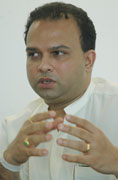At least 90 per cent of the population buys lottery tickets, in the hope of becoming rich overnight. When lotteries were introduced to this country, there were protests, especially from the Buddhists, but now the lottery ticket has become a part of life for us.
Go into any town in the country and you will find yourself in an atmosphere of gambling. Gaming centres are found in villages all over the country.
It is interesting that there are hardly any lottery stalls and book-making centres in areas frequented or occupied by the affluent. But in areas like the Pettah, where ordinary people move about, you find rows and rows of lottery stalls. The scene is like a lottery carnival.
Monte Carlo is the gambling capital of Europe, and its social life is centred on the casino. The gambling clubs there have long been associated with suicide. Monte Carlo averages eleven suicides a year.
Ruined gamblers swallow poison, shoot themselves, jump off bridges or leap in front of moving trains.
A German naval officer who lost a large sum of money in a gambling spree threatened to blow up the casino with the guns of his battleship. His threat was not taken seriously until the casino authorities saw the guns trained on their building. A casino employee was immediately dispatched in a speedboat with all the money the naval officer had lost. It is true that two centuries ago England built Westminster Bridge out of money generated by a lottery.
When the lottery mania went out of control, the public was told how individuals and families were ruined by the lottery craze. An Act of Parliament made all forms of lotteries unconstitutional and illegal. In Britain, the lottery lay dormant for more than a century before it was revived in 1956.
A.R. M. T. B. Ratnayake,
Kandy
The golden key to beggarhood
In her letter to the editor, Mrs. M. Dias of Ja-Ela (Sunday Times, 7.11.2010) discusses the plight of some 8,000 Golden Key depositors.
Despite repeated appeals to the Court, the Central Bank, the Watawala Committee, the media and discussions with the President, we unfortunate Golden Key depositors continue to live as beggars, with no hope of a better future and no final settlement in view. Have we not taken the golden key to beggarhood?
Yet Another GK Depositor, Colombo 5
Practise detachment
Weeks before the Presidential elections I wrote a letter giving my reasons why the citizens of this country ought to cast their vote in favour of Mahinda Rajapaksa and not Sarath Fonseka whom I described not as a great general but as a dogged general.
The thoughts in this letter are taken mostly from "Meditations" written by the Roman Emperor Marcus Aurelius.
The “Meditations” of Roman Emperor Marcus Aurelius has been bedside reading for kings, popes, cardinals, prime ministers and other leaders for the past two millennia.
Born in Rome in AD 121, Marcus Aurelius was a Stoic – a man with supreme self-control. He had been emperor for two decades at the time of his death, in AD 180, fighting the Barbarians. Much of the Stoicism he practised he had learned from his slaves, Epictetus and Rusticus. It was the fashion for Roman emperors to have as slaves philosophers, rhetoricians, scribes and Sophists.
In the “Meditations”, Marcus Aurelius counsels detachment. Fame is as a passing breath. The pleasures of the senses are deceptive. Wealth and power is transient. Marcus Aurelius found nothing secure or lasting or reasonable in human affairs.
Ephren Fernando,
Colombo 4
How the Japanese tackle flash floods
Our urban planners and civil engineers, among others, must find a permanent solution to our flooding problem.
Look at how Tokyo tackled the flash floods problem. They built a massive underground reservoir and a network of tunnels, tanks and pumps to collect the storm water.
The 14,000 horse-power jet turbines pump 50,000 gallons a second out of the system into the world’s largest storm drain. The complex is as big as eight football fields and is dug out to a depth of some 1,000 feet. It took 13 years to complete, and was commissioned in 2007.
Asoka
Weerakoon,
Kandy
Wheat flour drained of nutrients
The Times Economist carried an illuminating article on what happens to the wheat flour imported by a foreign company that has a monopoly on the import of wheat. Some 70 per cent of the nutrients in the wheat flour is extracted, and the residue is marketed as pure wheat flour. No wonder there is a high incidence of malnutrition, diabetes and heart disease in this country.
The wheat flour is depleted of vitamin B (thiamine), and what is marketed contains only 1/5 of the vitamin B content of the original wheat flour. Little wonder that the poor man who consumes a loaf of bread is hungry again half-an-hour later. The well-off can offset their hunger with other foods.
It is not in the country’s interest to allow this company to go on monopolising the wheat flour business.
The average labourer needs his full share of nutrients to do his work and get through the day.
Malnutrition among our children is alarmingly high. Hats off to the writer who has exposed the scandal in the wheat flour business.
R. S. L. Rajasinghe,
Colombo 14
The best is yet to come with Navin
The appointment of Navin Dissanayake as a fully-fledged Cabinet minister is good news to the people of the Nuwara Eliya district. The district is multi-ethnic and multi-religious, with various political parties and trade unions competing for power.
Mr. Dissanayake is a third-generation politician with a distinguished political lineage. His grandfather, Andrew Dissanayake, was the MP for Nuwara Eliya under the S. W. R. D. Bandaranaike government of 1956. He was also deputy minister of transport. His father, the late Gamini Dissanayake, was the MP for Nuwara Eliya from 1970 until his demise as the UNP presidential candidate in 1994.
Navin Dissanayake has an unblemished political record. He first contested the general election in 2000 and gained the highest number of preferential votes, 55,000, beating even established political leaders, such as the late Mr. Chandrasekaran.
In 2001, he received 75,000 preferences, the highest number for a Sinhalese candidate. At the general election, he beat established SLFP political leaders again by obtaining 43,000 preference votes.
I remember vividly how Navin structured and conceptualised the Presidential campaign of Ranil Wickremesinghe in 1999.
Powerful politicians in the district were backing Chandrika Kumaratunga, and everyone expected the district to go in her favour. However, Navin took the UNP campaign to both the Sinhala villages and the estates and ensured a victory for Mr. Wickremesinghe. In election campaigns, he has shown the ability to put a good team in place and produce results.
The tried-and-tested Dissanayake approach of sound planning, house-to-house canvassing and an accurate assessment of the ground situation has consistently produced results.
I remember another incident that tested Navin’s leadership skills. Mr. Wickremesinghe’s UNP government wanted to officially launch the Upper Kotmale project. However, Mr. Thondaman called a hartal and the estate workers took to the streets. Navin did not bow to political pressure. On the day of the hartal, he was seen on the streets clearing the burning rubber tyres in front of the estate workers. The people of the district know who fought for the project.
Navin has a lot of political capital in the district. He spends time with the people and he works hard, steering projects through. These include the new bus stand, opened in 2004; the new economic centre, opened in 2006; the ongoing sports stadium project, and the new Nuwara Eliya hospital. He has done much for grassroots development projects in education and health. He has helped set up clinics in about 60 per cent of the villages in the Nuwara Eliya district.
The Gamini Dissanayake Foundation offers a one-year diploma course in English and IT for talented but underprivileged youth of the district.
Navin’s decision to join the government in 2007 was motivated largely by his conviction that the LTTE had to be defeated if the country was to have a future. He was certain that the LTTE could be defeated.
President Mahinda Rajapakse has finally recognised Navin by giving him a Cabinet portfolio. The people of Nuwara Eliya are grateful to the President for this.
Francis Karunasena,
Former DDG Mahaweli
Authority |




